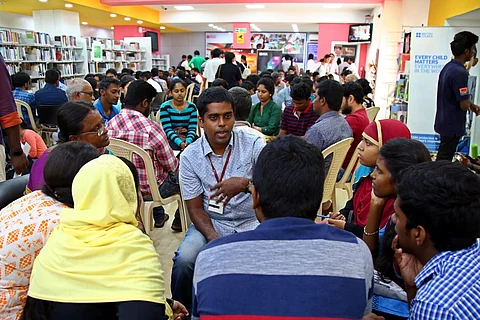

Big books, tall racks, readers with their heads buried in words. You try to start a conversation with someone sitting next to you. What greets you instead is a frowning librarian, pointing at a board that screams ‘SILENCE’ in big, bold letters. You sit down quietly because you know that a library isn't a place for conversation.
So, if you are someone who likes to talk, a regular library isn’t the place for you. What you need is a Human Library. Here, you don’t need to maintain silence; you need to talk. Confused? Let me explain. A Human Library is a place where you can issue a human ‘book’ and not the paper kind, and you can talk to them. People who have broken stereotypes, overcome prejudices and have an inspiring story to tell register themselves as books here. The readers can pick a book and have a one-on-one conversation with them.
The first ever Human Library in the world was held in Copenhagen, Denmark in 2000. With the idea to eliminate social biases and prejudices in mind, Ronni Abergel, along with his brother Dany Abergel and colleagues, Asma Mouna and Christoffer Erichsen developed the idea for the Roskilde Festival. It was a four-day-long event that lasted for eight hours each day and featured fifty different titles. The concept was an instant hit. Seventeen years later, human libraries now have a place in nearly 70 countries.
On July 1, Chennai joined the the Human Library family with its inaugural session held at the British Council. When I walked in, what welcomed me was 15 groups of people, huddled together, in deep conversations. I spotted an empty chair in Group 12 and decided to jump right in to experience it first hand. The book was Jessika Melody, a transgender who came out at a young age. Today, she works as a Happiness Consultant for a surprise planning company. “Being transgender, I understand the value of happiness in one’s life,” says Jessika, as her group of readers listen in.
It was the first time that most of them had interacted with a transgender. Armed to the teeth with questions, readers wanted to delve into every page of that compelling book in a span of thirty minutes. And the book was more than happy to open up about her life. She told us about the difficulties transgenders face to establish themselves rather than stick to the traditional transgender communities. “I’m lucky to have a degree in Business Administration. Education changes one’s outlook. I was employed by MNCs where no one treated me differently,” says Jessika.
For someone who wishes to bring about a major change among the members of the third gender, Jessika believes that she hasn’t achieved anything in her life. But a reader, Meghna is quick to correct her, “You’re an inspiration. It has been a pleasure getting to know you.” That is all the motivation Jessika needs.
“I loved being a book. Given a chance, I’ll be a book again. At the end of the day, what matters to me is meeting a few good people and making them smile,” she says. As those thirty minutes fly by undetected, someone asks, “Can we read you again?” But there were more readers waiting their turn.
Post the session, I caught up with Sailakshmi K V, the founder and book depot manager of Human Library Chennai, and this social worker was quite proud to be the one responsible for India’s sixth Human Library. So, what prompted her to get involved with the organisation? She educates me on their history and purpose across the world, while she narrates her story. “It was in April when I came across Harshad, who organised a Human Library in Hyderabad. The idea seemed interesting. I went on to research more. I know the beauty of a one-to-one conversation. It creates magic. So, I decided to go ahead with the idea,” she says. Prompt and enthusiastic, she applied for a license. “Only one person from a region is eligible for a license. I was lucky enough to have been chosen to get one,” says Sailakshmi, who plans to conduct such sessions once a month, adding, “We’ll add more books gradually.”
And how does one register themselves as a book? The process is quite simple. The person will have to talk to the book depot manager who first listens to their story before deciding if they become a book or not. The only criteria that they need to fulfil here are that they must have broken a stereotype and they should be in a peaceful state of mind now. Of the 20 registrations she received, Sailakshmi shortlisted 15 books.
By the end, I see readers leave with content hearts and open minds. “When we read a book we are bound to be left with many unanswered questions. But, here there is no scope for such questions as we can ask the book directly,” says a reader, adding, “Some of them are more interesting than actual books. If they were real books, I’d have chosen to keep them on my shelf forever.” Having attended the session myself, I can assure you that no truer words have been spoken.
